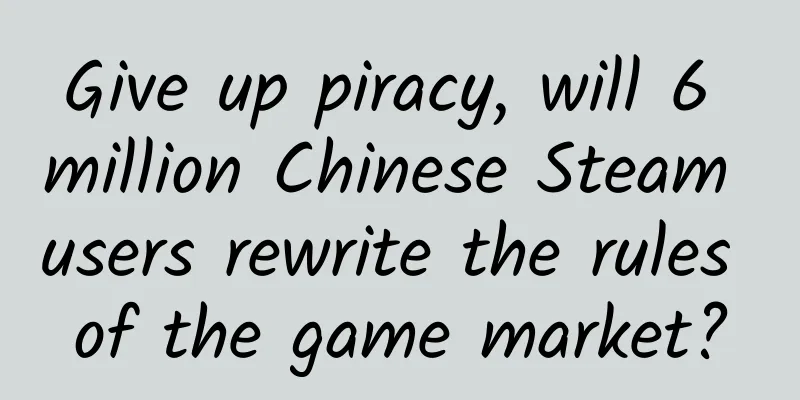Give up piracy, will 6 million Chinese Steam users rewrite the rules of the game market?

|
For most domestic gamers and developers, the Steam platform is not well known, but the series of miracles that Steam created in the gaming industry in 2015 are refreshing people's perception of it. Earlier, programmer Sergey Galyonkin released a report based on data from the Steam Spy analysis platform. According to the report, in 2015, players on the Steam platform spent at least $3.5 billion on paid games, a year-on-year increase of 58%. According to statistics, 3,000 new games were launched on Steam in 2015, a year-on-year increase of nearly 58%. The platform has more than 125 million active users worldwide and more than 12 million online users at the same time. For the global gaming industry, Steam's growth rate is undoubtedly astonishing. How is it performing in China? SteamSpy statistics show that there are approximately 6 million (6,197,136 ± 149,718) activated Steam accounts in China. 4% of the world's Steam users are from China, and the average Chinese Steam user owns 8 games. Taking "GTA 5" as an example, due to the price influence, 11% of the sales of this game came from Chinese users, with a total of 225,000 copies sold, contributing US$6.75 million in sales. Although the Steam platform is a niche platform, the number of players, activity level, and consumption enthusiasm are higher than those in the domestic game console market. The changes it will bring to the development of the domestic game industry in the future are immeasurable. Let domestic players give up pirated games In the gaming world, free pirated games seem to have become a label that Chinese players cannot get rid of. In the past, due to the rampant PC pirated games, PC blockbusters could rely on their popularity to gain certain sales, but small and medium-sized games basically could not escape the fate of being pirated. On the Steam platform, paying for games has become a default rule that everyone abides by. This does not mean that the Steam platform has taken many passive defensive measures against piracy. On the contrary, it has adopted an extremely radical policy - through continuous upgrades, the living space of pirated games has been rapidly reduced. For example, although iOS can obtain free software by jailbreaking, once the system is upgraded, it needs to be jailbroken again, which fundamentally compresses the living soil of pirated games. For Chinese players, the low price of games on Steam is also a major reason why players are willing to spend money to buy genuine games. Since the Steam store supports RMB settlement, the Steam China area has almost become a low-price area. The half-price sales strategy of popular games such as "GTA5" and the special Christmas promotions last year have successfully attracted a large number of Chinese players. You can buy a genuine PC game with the price of a few bottles of Nongfu Spring and enjoy better services and battle platforms. Why not? In addition, the genuine cultural atmosphere on the Steam platform is also unmatched by other gaming platforms. Steam has built a unified platform for global players. Once you enter this circle, you will be infected by this atmosphere, trading games, making friends, buying games and collecting cards, unlocking achievement communities, which makes the previously scattered PC games become unified management on Steam. The existence of the community system has also greatly stimulated the vanity of players, who use relatively low prices to buy games and compete with each other in terms of game time to show their status on this platform. In this gaming atmosphere, pirated games naturally become "non-mainstream". Gabe Newell is the CEO of Valve (Steam was developed and designed by Bram Cohen, the inventor of BT download, hired by Valve). He once said, "Overall, we feel that the industry has a very basic misunderstanding of piracy. In fact, piracy is more about service issues than pricing issues. For example, if pirates supply the world 24×7, and you can buy it directly on your PC without leaving your home; and the legitimate provider imposes a geographical restriction on a product, limiting it to 3 months after it is released in the United States before it can be released in your country, and you must go to a physical store to buy it... Then there is no doubt that the pirates' service is more valuable. Our goal is to provide a more valuable service than pirates, and this approach has been very effective. For example, before we entered the Russian market, everyone said it was a waste of time because everyone was downloading pirated copies. Now Russia has become our largest market in Europe." Of course, as long as it is a PC game, it is inevitable that it will be pirated. Steam's approach is more like guarding against gentlemen rather than villains, which has cultivated the paying habit of some game players. Give independent game developers a chance At present, the system of the game market is very similar to the model of Hollywood movie production. Small game companies are responsible for the development and production of games, but in the end, large game companies buy out the copyright and sales rights, and most of the profits belong to large game companies. In particular, the domestic mobile game industry has basically become a stage for large companies. Some low-cost and independent games are difficult to be favored by publishers, and difficult to be known by players and become popular overnight. In this situation, small and medium-sized game production teams and independent game developers are in urgent need of a display platform so that they no longer have to look at the faces of publishers and worry about being squeezed out of their living space by 3A masterpieces. Three years ago, Steam launched the "Greenlight" project to support independent game development. On this platform, developers can publish information, screenshots and videos for their games, and then get enough community support so that the game can be selected and finally released. This sounds similar to the model of Kickstarter, a world-renowned crowdfunding platform, except that Kickstarter users use money to vote for products, while Greenlight raises the fame of the game. Steam is often compared to the App Store on PC. Its emergence has greatly simplified the steps for developers to get their games to users, breaking the monopoly of large game publishers on sales channels. This has made small and medium-sized teams more willing to join the game industry and do innovative work that large game manufacturers are unwilling to try, thus stimulating the creativity of small and medium-sized teams. Industry insiders believe that the five major benefits of Steam are: 1. Small and medium-sized manufacturers no longer need to hand over their profits to publishers; 2. Small and medium-sized manufacturers can retain the copyright and trademark rights of the game; 3. Small and medium-sized manufacturers have greater autonomy; 4. Reduce the sales costs of small and medium-sized manufacturers; 5. Low-budget games can also have the opportunity to go global. However, we should also realize that Steam is not omnipotent, and "Greenlight" also has some drawbacks. For example, some interesting mini-games cannot be "favored" because of the voting method, which often makes the game works more kitsch, and developers who are good at marketing are ranked higher. There is no absolute fairness, and some high-quality game works may eventually become missed gems. In summary, in the short term, it is a bit far-fetched to bring substantial rule changes to the Chinese game market through Steam's 6 million users. However, just like the App Store for mobile software and Taobao for retailers, Steam is trying to break down the towering barriers between players and game developers. This is undoubtedly the fastest way for game industry developers or developers to achieve success. As a winner of Toutiao's Qingyun Plan and Baijiahao's Bai+ Plan, the 2019 Baidu Digital Author of the Year, the Baijiahao's Most Popular Author in the Technology Field, the 2019 Sogou Technology and Culture Author, and the 2021 Baijiahao Quarterly Influential Creator, he has won many awards, including the 2013 Sohu Best Industry Media Person, the 2015 China New Media Entrepreneurship Competition Beijing Third Place, the 2015 Guangmang Experience Award, the 2015 China New Media Entrepreneurship Competition Finals Third Place, and the 2018 Baidu Dynamic Annual Powerful Celebrity. |
<<: CES Observation: Female users become the new favorite of smart hardware industry
>>: Is virtual reality the next 3D TV?
Recommend
A few words but a lot of meaning! A college admissions brochure with only one sentence
July 5 Northwestern Polytechnical University rele...
Who is Zeng Hou Yi of Suizhou?
This is a Names not recorded in history books 197...
Geely Auto Financial Report: Geely's total revenue will reach 240.2 billion yuan in 2024, a year-on-year increase of 34%
Geely Auto released its 2024 and Q4 financial rep...
The latest news on Dalian’s lifting of lockdown in 2022: When will it be lifted? Is it unblocked now?
Recently, in this round of local epidemic in Liaon...
A practical course on personal IP in the food industry. For ordinary people, selling food and snacks is a very close option to monetization.
A practical course on personal IP in the food ind...
Postpartum recovery course
Introduction to postpartum recovery course resourc...
The Gate of True Love "Matrix Awakening" video tutorial
The Gate of True Love "Matrix Awakening"...
App promotion and application insight report!
According to our data monitoring of the mobile ap...
Stop stepping on the toilet seat! Your toilet seat may be dirtier than the public toilet!
Dirty and unhygienic...this is what many people t...
Iris recognition, gait recognition...the best cryptography is hidden in the human body!
When it comes to passwords and cryptography, peop...
How to make robots? How to write robots?
How to make robots? How to write robots? For robo...
How to plan a promotional event that will attract a lot of people’s participation? Just read this one
This article introduces four strategies for plann...
'Lord of the Rings' director: Mixed reality will replace mobile phones
Mixed reality devices like HoloLens and Magic Lea...
Baidu, Massive Engine, Guangdiantong, Massive Qianchuan 4 major channel promotion skills
People often ask, which channel is most effective...









